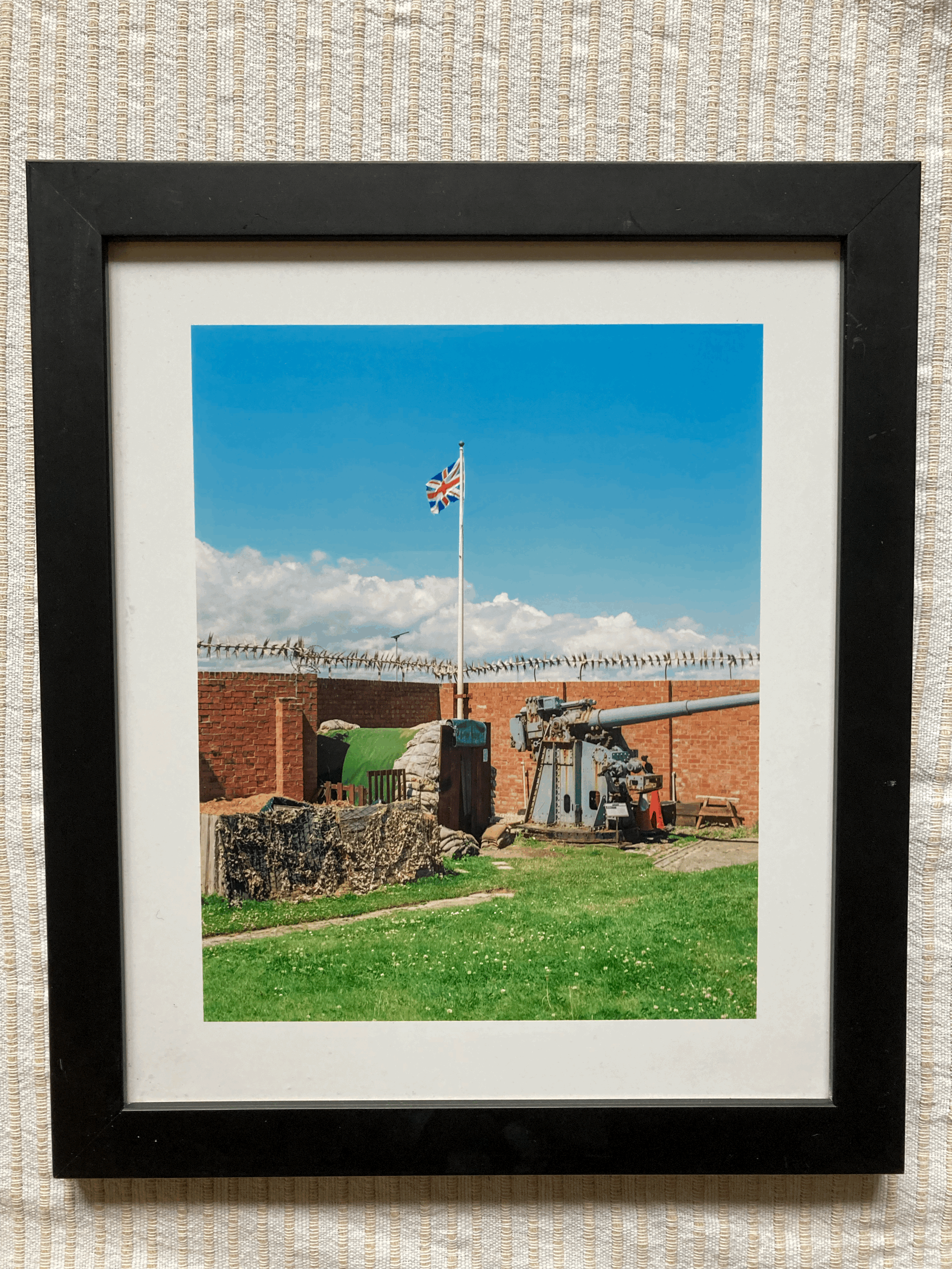 Image 1 of 2
Image 1 of 2

 Image 2 of 2
Image 2 of 2



Heugh Battery. Museum, Hartlepool
The histories of Hartlepool and Karadi reveal a profound colonial connection that shapes contemporary identities, including my own. This photograph of a Union Jack flying over the museum encapsulates Paul Gilroy's concept of postcolonial melancholia, reflecting Britain’s obsession with its wartime legacy as a substitute for addressing the violence of its colonial past. While it evokes pride in national history, the image is steeped in nostalgia that often obscures the darker aspects of empire. Juxtaposed with Gandhi's hut, it contrasts non-violent resistance with symbols of British imperial power, highlighting the tension between celebrating a heroic history and confronting colonial legacies.
The histories of Hartlepool and Karadi reveal a profound colonial connection that shapes contemporary identities, including my own. This photograph of a Union Jack flying over the museum encapsulates Paul Gilroy's concept of postcolonial melancholia, reflecting Britain’s obsession with its wartime legacy as a substitute for addressing the violence of its colonial past. While it evokes pride in national history, the image is steeped in nostalgia that often obscures the darker aspects of empire. Juxtaposed with Gandhi's hut, it contrasts non-violent resistance with symbols of British imperial power, highlighting the tension between celebrating a heroic history and confronting colonial legacies.
The histories of Hartlepool and Karadi reveal a profound colonial connection that shapes contemporary identities, including my own. This photograph of a Union Jack flying over the museum encapsulates Paul Gilroy's concept of postcolonial melancholia, reflecting Britain’s obsession with its wartime legacy as a substitute for addressing the violence of its colonial past. While it evokes pride in national history, the image is steeped in nostalgia that often obscures the darker aspects of empire. Juxtaposed with Gandhi's hut, it contrasts non-violent resistance with symbols of British imperial power, highlighting the tension between celebrating a heroic history and confronting colonial legacies.
These exclusive prints are part of my ongoing project Space, Place, and Identity, first showcased at Four Corners Gallery in Bethnal Green. As the only prints available, each piece is a unique, one-of-a-kind edition (Print 1/1), making it a rare opportunity to own a part of my work that blends social commentary with visual storytelling.
My work merges photography with social commentary, shaped by a deep interest in localism, micro-communities, and subcultures, particularly those connected to migration and cultural identity. With a background in Politics and Sociology, I approach my photography through a multidisciplinary lens, blending academic inquiry with artistic exploration.
In 'But where are you really from?', I examine the complexities of biracial identity by navigating the intertwined histories of my family in Gujarat, India, and Hartlepool, England. Through a series of photographs, I reflect on how migration, cultural memory, and postcolonial politics shape personal and familial identity. The images contrast India’s agrarian landscapes with England’s industrial past, exploring the tension between these worlds and how they inform my understanding of home and belonging.
The sale of these prints will directly support the continuation of this project, funding my return to both India and Hartlepool to complete the work. The long-term goal is to turn this project into a book, offering a nuanced exploration of heritage, belonging, and the fluidity of bi-racial identity.
Your purchase makes a difference:
5 prints = Flights to return to India to complete the next stage of the project
6 prints = Train ticket to Hartlepool to continue exploring the historical and personal dimensions of the project
10 prints = 40 rolls of film, essential for documenting and capturing the essence of this journey
15 prints = Lab costs to develop and scan the film, ensuring high-quality production for future exhibitions and publications
The prints come framed in the same black-rimmed wooden frames with glass that were used in the exhibition at Four Corners Gallery. These frames are included with your purchase, offering a professional and polished presentation, and are a direct extension of the exhibition itself.
By purchasing a print, you are not only owning a unique artwork but also directly supporting the continuation of this project and helping to explore and document the multifaceted nature of identity and belonging. Thank you for being part of this journey and making this work possible.
Print Specifications
Paper Type: C-type Fuji Matt
Print Size: 255mm x 300mm
Frame: Black-rimmed wooden frame with glass
Frame Size: 300mm x 350mm
Packaging: Prints and frames are packaged in protective bubble wrap and a sleeve, with a hand-written note included.
Postage: £10 for 1st class delivery to ensure the frames are securely protected during transit.